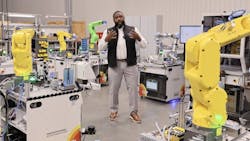Faces of Manufacturing: Be a Sponge and Absorb All You Can
Ted Rozier
City/State of Residence: Eatontown, New Jersey
Job Title: Director of Digital, Advanced Technology and Robotics
Company: Festo Didactic North America
Industry of Your Company: Automation
Years with Company: 11
Training / Education: Henry Ford Community College in Dearborn, Michigan. Completed a mechatronics apprenticeship program at Doosan Infracore Machine Tool, then started career as an electrical automation engineer at Doosan Infracore in Pine Brook, New Jersey. Worked there for 16 years before joining Festo Didactic.
What made you decide to pursue a career in manufacturing?
It was actually my grandfather. My grandfather worked in a manufacturing plant. He worked for GM, and he talked a lot about the dull, dirty, dangerous side of the business, but he was always amazed at the robotics that were coming into the manufacturing plant. He would always talk to me about the advancement in technology with the intention of inspiring me to pursue emerging technologies such as robotics and automation manufacturing as a career.
What does your job entail?
As the director of digital, advanced technology and robotics, I lead our custom solutions team when it comes to implementing emerging technology solutions that are used within high schools, community colleges and universities to teach smart manufacturing methods as it pertains to the overall systems approach.
I work alongside the technical team and sales team, with the goal of making sure that the curriculum storyboarding through the design of the solution is tightly woven together. Working closely with our sales team I also take the lead in high-level presentations that require subject matter expertise.
More Manufacturing Day coverage here.
What we do as an automation manufacturing system integrator for education is very unique because we don’t get to just design a piece of equipment, we have to develop and document curriculum. Then, last but not least, [we] align the systems with a comprehensive certification program to establish trust and credibility between ourselves, industry and our customer, the training institution.
What is the most interesting part of your job? Your proudest moment?
Listening and understanding our customers’ needs. I love when I get to sit down with an educator and allow them to dream, and then help bring their dream to fruition in a product. It’s always a proud moment to watch the customer take control of their hands-on training solution and deliver certifications to their students via our Train-the-Trainer program. When they start to drive the program on their own and gain mastery over an emerging technology, now it’s tangible, now it’s real, and producing real results, and it’s a beautiful thing!
What do you love about manufacturing?
There's never a dull moment. I really enjoy guiding and inspiring my team. I think that is where my joy really lies, in working closely with my team and getting the most out of them in such a fashion where they enjoy it. So, it's working with people, but making others happy and doing something that's very difficult.
What advice would you give to kids considering a job in manufacturing?
Oh, they need to be a sponge. When it comes to engineering and manufacturing, there's so many different avenues that a student can take. But they need to be a sponge first and do a lot of listening, ask a lot of questions, and be open-minded to new things and new technologies. They need patience and respect to learn and grow by applying themselves through the hands-on aspect of what we do, not just a quick Google search. They also need to exercise humility because technology can drive you insane if you are a perfectionist!
What advice would you give to manufacturers to help increase kids' interest in manufacturing as a career choice?
Almost everything touches a manufacturing process, so kids need to understand that almost all of the things they touch are manufactured—their toothbrush that they use in the morning, the produce from the grocery store, the buses and cars that drop them off at school. They can be a part of an exciting, “futuristic” and essential career, if they only knew about it.
Then of course, manufacturers must also share and bring to light the use of emergent technologies. Pique kids’ interest by showing them which high tech systems and tools are being used in their manufacturing plan, and allow students to see how it's being applied to the process.
